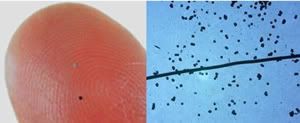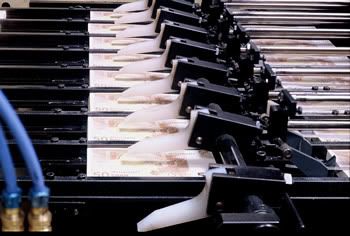| The European Central Bank (ECB) has announced the inclusion of RFID Tags in all Euro notes above €20 from February 2007 to improve counterfeit detection to counter the laundering of Euro banknotes. The technology, proposed by Dennis Kügler in 2004 was lauded by fraud experts who claim that the ECB’s tracing and linking algorithm (TLA) will make each of the three traditional steps in laundering money – placement, layering, integration and integration – more difficult. This is thanks to a network of RFID readers which ECB officials hope to deploy in banks and other cash placement locations all over Europe.
| ||
 Example of the so called "powder" RFID chip
| ||
|
A line in the Berlin mint where the first tagged | Technology and currency aficionados are enthused by the new technology, a 0.05mm x 0.05mm chip manufactured by Hitachi and code-named “powder” which costs 7 eurocents per chip. The chip beams a 128-bit code -which includes the note’s serial number - to a receiver which in turn uploads the data to the ECB’s central database where the TLA checks aggregate data for suspicious activity. “As RFID readers become ubiquitous and less expensive, we hope to see them in a variety of locations including banks and retail stores” said Prianka Chopra of the ECB in a recent press summit. "The main objective is to determine the authenticity of money and to stop counterfeits,"
| |
| The receivers which have been field-tested successfully along with the circulation RFID enabled notes in Antwerp and in a number of Belgian banks, also have a built-in counterfeit-detection mechanism based on the RFID technology which is expected to add to current counterfeit detection devices. According to an ECB spokesman, “We expect this to be more useful when all notes in circulation have RFID tags”
|
The first batches of RFID enabled banknotes | |
Erik B. of eurobilltracker.com, a Euro banknote tracking website is enthusiastic about the new technology, claiming that one side-effect would be useful information on movements of tourists and business people across Europe. However, not everyone is so delighted with the move. Privacy advocate and anti-RFID activist, Richard Stallman has denounced the move as “yet another attempt of the authorities to snoop into ordinary people’s privacy.” Fears have also been raised that would-be pickpockets could scan victim’s wallets in order with a very simple RFID receiver. | ||
Friday, July 20, 2007
RFID Tagged Euro Banknotes Now In Circulation
Subscribe to:
Post Comments (Atom)


No comments:
Post a Comment